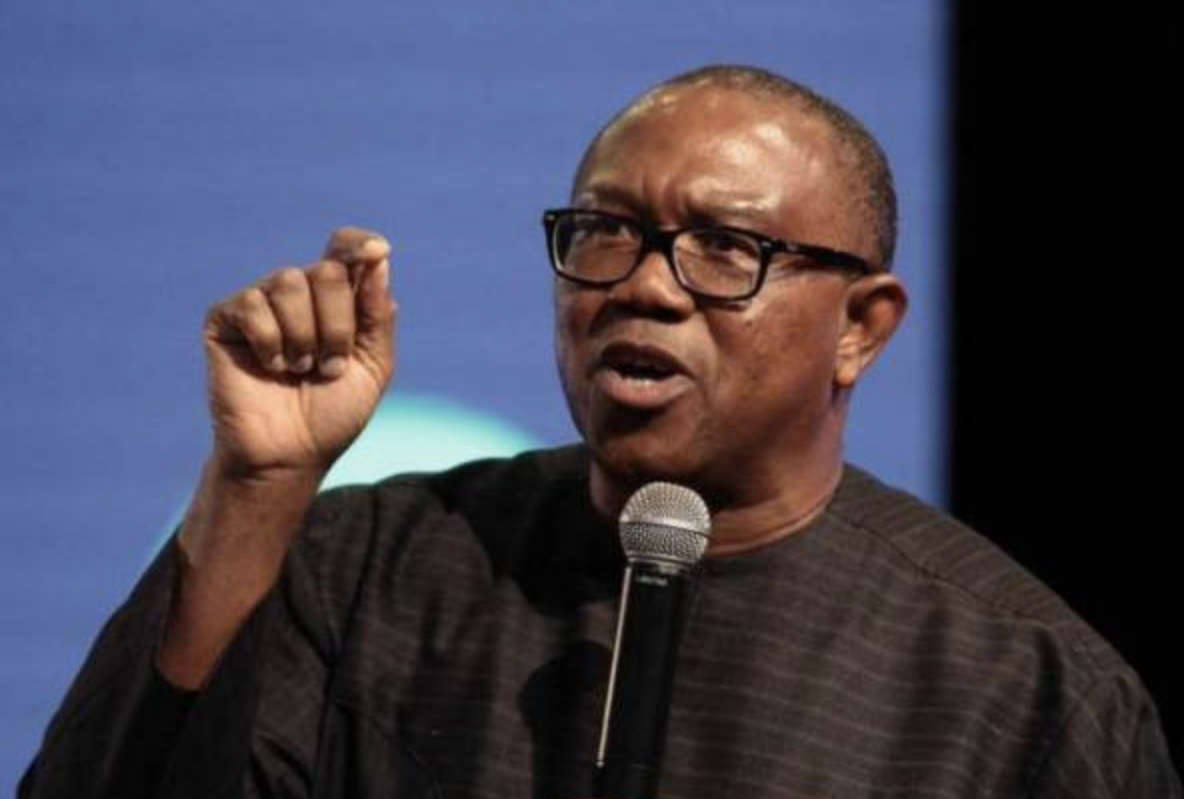by Nnaoke Ufere, PhD
The primary focus of Mr. Peter Obi’s national economic strategy — which I call Obinomics — is on unleashing an industrial renaissance, never before seen in Nigeria, to deliver the lasting benefits of a more innovative, resilient, progressive and productive economy.
These benefits aim to drastically reduce unemployment, where every Nigerian who needs a job can find one. It will also improve economic growth, provide better economic fortunes, reduce poverty, increase standard of living, and advance the overall social wellbeing of all Nigerians.
Ultimately, Obinomics aims to deliver inclusive prosperity and lead to national security, political stability and equality of opportunities. Importantly, it will hasten the transition from an oil-dependent economy to an innovation-driven entrepreneurship.
According to independent development experts who have evaluated the preliminary economic agendas from the three presidential candidates, Obinomics has the best chance to improve Nigeria’s current uncompetitive rank of 116th out of 147 economies (2019 Global Competitive Index by World Economic Forum) and position the nation as a dominant economic player in the world.
Top Nigerian professional economists and I join our international colleagues to applaud Mr. Obi’s vision, and we approve of his plan to rebuild the Nigerian economy.
What distinguishes Mr. Obi’s plan from the others is that it recognizes that the era when natural resources dominated international trade is over. And that a new era of knowledge-driven, productive economy offers the foundation of greater economic performance and social development for Nigeria.
As noted by the World Bank, and in concordance with Obinomics, if Nigeria is able to unleash the power of entrepreneurship to create, acquire, adapt, and utilize new ideas and innovations, it will create enormous wealth for its people.
There is no argument, therefore, that a great opportunity for 21st Century Nigeria and beyond lies in transitioning from current consumption economy to the productive and competitive economy proposed by Mr. Obi.
Experts agree that Obinomics will lay the foundation for Nigeria to become a dominant world economic power in the coming decades. In the year 2100, Nigeria, already Africa’s most populous country, will have a population of 791 million people (UN Population Estimates) as the rest of the world shrinks. It will become the second largest population in the world after India (1.09 billion). China will be third with 732 million people. This means that Nigeria has the inherent potential to become the third largest market in the world.
However, without significant economic growth to match the population growth, the nation will face inescapable policy-making challenges, especially given our history of bad leadership, persistent corruption, high poverty level, income disparity, low human capital development, over-reliance on a diminishing commodity – oil, and above all, unproductive economy.
This is another important reason why experts agree that with or without Mr. Obi, Nigeria must seize the unique opportunity Obinomics presents, as dependence on oil crumbles, to launch a new path toward the productive economy and sustainable development proposed by Mr. Obi, one that leaves oil behind and brings along a better future of greater and more inclusive prosperity to support a growing population.
With this as background, I’ll flesh out Obinomics, identifying the foundations upon which to build a productive economy and the challenges that must be overcome to realize the economy’s full potential.
I begin by addressing the biggest questions right up front. What makes an economy productive and progressive? What foundations are required to build and implement Obinomics and deliver benefits to Nigerians? What pragmatic policies are needed to achieve these benefits?
By productive economy, Obinomics portends an economy based on knowledge, innovation and productivity, where knowledge workers can produce innovative and value-added products and services in abundance for the same amount of input, achieving high productivity, increased economic growth and high competitiveness.
Now we understand why experts agree that Obinomics is a game changer.
Foundations Of Obinomics
The foundations required to successfully build and implement the productive economy espoused in Obinomics can be represented in six typologies: adequate availability of (1) physical infrastructure, (2) human capital, (3) technology, (4) financial capital formation, (5) innovation and entrepreneurial culture, and (5) quality institutions.
In the following sections I’ll briefly evaluate the adequacy of the six foundations and propose policy remediations, where necessary.
Physical Infrastructure Requirements
By adequate physical Infrastructure I mean:
1. Uninterrupted and cost-effective power supply to ensure lesser downtime for industries.
2. Adequate and constant water supply to ensure efficient production processing and agribusiness.
3. Good transportation systems and supply chain networks — roads, waterways, air and rail to support fast transfer of goods and labor mobility.
4. ICT infrastructure to achieve the highest broadband penetration, effective communications, efficient business transactions and rapid sharing of information.
My verdict is that current conditions of physical infrastructure is woefully inadequate, exposing vulnerabilities in Mr. Obi’s productive economy agenda.
We need a much efficient and smarter infrastructure, both for production efficiency, supply chain effectiveness and cost-competitiveness.
Policy Recommendations to Improve Physical Infrastructure
1. We need to invest heavily in infrastructure development today that will result in a stronger, more productive and sustainable economy tomorrow. Substantial improvements are essential for rapid economic growth anticipated with Obinomics.
2. Urgency is required in investments to modernize dilapidated transport and communications systems, and epileptic electric power and inadequate water supplies for domestic, agricultural and industrial use.
3. Each state should be granted the legal, administrative and financial support to modernize its infrastructure within a federal framework.
4. The federal government should reimburse, or at a minimum subsidize, domestic businesses that supply their own utilities the cost difference between market rate and the actually costs incurred in supplying their own utilities. The reimbursement program will need proper verification.
Human Capital Requirements
Denote both the quality and quantity of the brightest technical and managerial minds to innovate, conceptualize, design, produce, distribute and manage new products and services in the new productive economy.
Research has shown that no country has achieved substantial economic development without significant investment in human capital.
My verdict is that the quality and quantity of skilled workers needed to run a productive economy does not exist currently. The nation’s stock of skilled labor is underdeveloped, inadequate and uncompetitive.
Our human capital stock is weakest in the sciences and technology, resulting in a lack of technological expertise to bring to bear on key areas of design, manufacturing and distribution of value-added products and services in a competitive global market.
Decades of declining investments in education, outdated science and engineering curriculum, poor quality of academic staff and perennial shutdown of universities by ASUU and the government resulted in a lack of well-trained native-born recipients of advanced STEM degrees.
This acute shortage of skilled manpower is a threat to implementing Mr. Obi’s productive economy agenda.
Policy Recommendations to Improve Human Capital
1. It is imperative that if elected, Mr. Obi must first address the failures of past governments which led massive emigration of Nigeria’s skilled middle-class, our best educated citizens, to Europe and North America.
2. Establish a suitable environment and incentive structure to motivate highly skilled Nigerians in high demand labor categories to stay, while attracting equally skilled Nigerians in the diasporas to come home.
3. Create an attractive immigration program to bring in high skilled workers from abroad who can train and transition expertise to Nigerians over a long period of time.
4. Disband federal character. Enforce free market for talent — one of the greatest inventions of the human race because it is so efficient and effective and, as a result, will generate enormous productivity and value for the nation. Economic growth rates are much greater and social welfare much higher under nations with free market for talent.
5. Importantly, make sustained investment in technical education, scientific research, skill upgrading for current workers, and apprenticeship.
6. These investments must target areas of highest national priority in science, technology, engineering and mathematics (STEM).
7. Funding allocation to education as percentage of national budget should increase from current 6% to over 20%, which is common among the most competitive nations.
8. Sponsor top graduates from Nigerian Universities to attend graduate science and engineering schools abroad on scholarship. After graduating, support the graduates to gain employment abroad in areas of national interest. After a few years working abroad, these highly skilled Nigerians will be incentivized to return home, bringing their skills and expertise.
9. Establish a national apprenticeship policy in partnership with private businesses in each state. The government should support trainees who successfully complete apprenticeships with resources, including finance, to setup their own businesses in the areas they trained.
Technology Requirements
This important foundation denotes appropriate technology as the backbone of a productive economy. Technical systems are needed to mechanize manufacturing, production and supply chains to improve output per unit time and accelerate distribution of goods and services in a cost-effective way.
My verdict is that the existing technology base is antiquated, woefully inadequate to drive and support a productive economy. It must be upgraded.
Policy Recommendations to Improve Technology
1. Conduct a thorough technology evaluation to identify the technologies we need to develop, acquire or adapt to fit specific production requirements and drive the productive economy.
2. Adopt and deploy simple well-known managerial techniques and best practices from other economies.
3. Invest in R&D in both educational institutions and private research facilities. The key for success is carefully channeling funds only to high-performing national centers of excellence in technology research and development.
4. Strengthen the collaboration between all national centers of excellence in research, including targeted private sectors.
5. Specify and enforce strict intellectual capital protection and technology transfer rules, and demand technology transfer from MNCs (multinational corporations) in return for market access.
6. Require by law that MNCs who want to enter the growing market in Nigerian to share their risk and the profit with us. We will work with them if they bring the latest technology and sufficient capital. Nigeria will bring the labor, land, market, and local inputs. When they get here, we want to know all about all their related technology, management know-how, and processes. They must teach Nigerians how to use, how to repair, how to improve their products and services.
Capital Formation Requirements
Capital is a key input in any successful economy. For a productive economy to function and flourish, a growing proportion of businesses will need efficient access to low-cost financing. Further, foreign capital is essential to the implementation and growth of Nigeria’s industrial sector under Obinomics.
My verdict is that access to finance and the cost of finance are major barriers to doing business in Nigeria, especially for small and medium enterprises. Excessive collateral requirements by Nigerian banks make it all but impossible for young firms without land and building assets to receive loans.
Policy Recommendations to Improve Capital Formation
1. Establish privately-run venture capital (VC) firms jointly seeded by investors and the government to provide loan finance and equity capital to entrepreneurs. Set up the VC firm as a dedicated public-private partnership with operational control in the private domain.
2. Establish a new Small Business Administration, similar to those in the USA and other developing economies, in each state and the FCT. The national Small Business Administration (SBA) will assist small businesses to get funding by setting federal guidelines for loans and reducing lender risk through loan guarantee. Small business owners can start or expand their business with SBA loans.
3. Reform and streamline the Nigerian Investment Promotion Commission (NIPC). The commission should be led by experienced businesspeople who have the expertise and credibility to attract foreign direct investment (FDI) on behalf of the government.
4. Each state should be legally and administratively empowered by law to solicit FDI to meet its economic development plan in line with the tenets and framework of Obinomics.
5. Establish business-friendly laws and streamline regulation to make investments and remittance of profits by MNCs efficient and mutually beneficial.
6. Strengthen intellectual property rights protection to encourage MNC to invest and other FDI and local investments.
Innovation & Entrepreneurship Requirements
A sustainable productive economy is built on the foundation of innovation and entrepreneurship. Empirical association between innovation, entrepreneurship and economic growth is well-established in the economic literature. Economists and innovation experts have long reported that 50 to 80 percent of the notably striking inventions are produced by inventors from small-scale entrepreneurial ventures.
My verdict is that Nigerians are talented entrepreneurs. But most operate small-scale enterprises as necessity-driven, subsistence entrepreneurs who are either retired or could not find better options for work.
We need more opportunity-driven entrepreneurs who are innovative and can start new firms based on the discovery of unexploited or underexploited business opportunities.
Opportunity entrepreneurs are important contributors in a productive economy proposed by Mr. Obi. Nigeria has a deficit of both breakthrough innovations and opportunity-type entrepreneurs.
Policy Recommendations to Improve Innovation & Entrepreneurship
1. To foster economic growth and employment, the new government must encourage and incentivize an innovation and entrepreneurial culture. The focus must be on creating an enabling environment for innovation to foster and for entrepreneurs and new ventures to grow and succeed. Create a policy environment where moonshots are possible, and failures are accepted.
2. Protect and promote intellectual property rights. Safeguarding property rights, such as inventions, gives innovative entrepreneurs an incentive to find and exploit new opportunities to improve their lives and the economy.
3. Excise onerous regulations constraining the formation of new ventures and the freedom of firms to operate efficiently. Eliminate or streamline all regulatory burdens and legal constraints (new business registration, licensing, inspection of business premises, import and export procedures, etc.) that hinder entrepreneurship and new venture formation.
4. Reduce taxes on new ventures and eliminate state and local government levies for a specified number of years to allow new entrepreneurial firms to establish root, grow and flourish.
5. Establish flexible and low-cost funding options for valid entrepreneurs. As stated before, the new administration should establish a SBA loan guarantee and invest in Venture Capital firms in partnership with private investors to seed innovative and scalable new ventures.
6. Delegate more responsibilities to states and local governments to drive and invest in innovation. States and local areas are often able to act more quickly with innovation promoting regulations than the federal government.
Institutional Requirements
A stable political and policy environment, security of life and properties and an inclusive culture are salient requirements for a productive economy to flourish.
In addition, political stability and security and friendly business climate are factors that attract foreign capital, technology and innovation.
Further, quality institutional environment across the nation will promote investor and business partner confidence, stimulate investment in factors of production, and accelerate infrastructure innovation.
My verdict is that the advances we’ve made in democracy are positive enablers for Obinomics. However, current state of insecurity, political instability, ethnoreligious crises, banditry, kidnapping and a culture of corruption are significant impediments we must overcome to realize the enormous benefits of Obinomics.
Policy Recommendations to Improve the Quality Of Institutions
1. Security is paramount. As president, Mr. Obi should demand a new counterinsurgency and counterseparatist policies to understand the tactical, operational, and strategic approaches required to win the asymmetric war against insurgency and separatist movements.
2. Integrate political, economic, social, and military resources to persuade the insurgent and separatist political decisionmakers to reach a negotiated settlement.
3. Trace and bring to justice sponsors and financers of insurgents and separatists.
4. As we’ve learned from other asymmetric wars, it’s ultimately about winning hearts and minds, not battles. Therefore, the new administration must work collaboratively with states, local government areas, traditional rulers, and religious organizations to alleviate poverty and unemployment by accelerating the implementation of Obinomics.
5. Implement social welfare policies and training programs to dissuade young people from joining insurgent networks and separatist movements.
6. Amend the immunity clause. Politicians and their facilitators who commit serious crimes, including looting public funds, extra-judicial killings, illegal importation of arms, sponsoring militant groups and other grievous offenses against countless and defenseless citizens should be arrested, tried, and charged with felony against the welfare of the people.
7. To fight corruption, implement validated and efficacious blockchain technology to decentralize decision making and funds flows currently concentrated in the hands of a few corruptible bureaucrats. This technology will mitigate corruption risks before they even materialize into national wealth loss.
8. Mandate collection of beneficial ownership information at the time of real estate transactions. As for existing real estate assets, all real estate owners—corporate and individual—should be required to declare and reregister their assets and affirm terminal ownership—direct or equity-wise. Beneficial owners must show proof of source of income used in acquiring the property. The income declaration must match income reported in their tax returns.
In this policy paper, I’ve attempted to identify the major opportunities we must capitalize on and challenges we must overcome to realize the enormous benefits of Obinomics. It is important that Mr. Obi’s economic team broaden or deepen their analysis of the factors influencing the proposed productive economy identified in this paper.
The Obi administration or any other should look into the fundamental matters of physical infrastructure, human capital, technology, capital formation, innovation and entrepreneurship, and institutional foundations required to incentivize and shape the capabilities and behavior of economic actors who will make Obinomics a reality. Obinomics is the future of our nation and the hope of our people. As such, it is our collective responsibility to make it work for us.
In this industrial renaissance, we are engaged in a common enterprise; we are dependent on each other; our fortunes in Nigeria will rise or fall together depending on how effective we join together to realize the enormous benefits of Obinomics – economic growth, low unemployment, inclusive prosperity, national security, political stability, social cohesion, and the alleviation of poverty. It will be morning again in Nigeria.
Of course, implementing Obinomics will present its challenges. The good news is that in Peter Obi we have a visionary, a pragmatic and problem-solving leader and champion for the common person.
This is why I argue that a President Obi will be well suited and well-equipped to meet these challenges head-on, more than any other politician.




